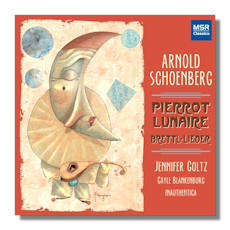
The Internet's Premier Classical Music Source
Related Links
- Arnold Schoenberg Reviews
- Latest Reviews
- More Reviews
-
By Composer
-
Collections
DVD & Blu-ray
Books
Concert Reviews
Articles/Interviews
Software
Audio
Search Amazon
Recommended Links
Site News
 CD Review
CD Review
Arnold Schoenberg

Songs
- Pierrot lunaire, Op. 21 (1912)
- Brettl-Lieder (1901)
Jennifer Goltz, soprano
Gayle Blankenburg, piano
Inauthentica
MSR 1208 55:55
Summary for the Busy Executive: Light moon and dark moon.
In 1901, Schoenberg found himself in Berlin, struggling to make ends meet. Among other things, he got jobs orchestrating forgettable operettas. He also found a side gig as music director in what was known as the Überbrettl (super-stage), essentially a cabaret movement of artists and writers trying to use popular forms for more sophisticated or serious ends. This was to culminate in the Twenties and the Weimar Republic, with music by Weill, Hollaender, Eisler, and Stransky. Schoenberg even tried his hand at a few cabaret numbers himself – hence, the Brettl-Lieder.
When I first heard these a number of years ago, they surprised me. As much as I admire Schoenberg, I never thought of him as charming, and these make you fear for your socks. Their raciness – mostly of the Fledermaus type, but at least one full of double entendres, about a girl who lies around the house all day stroking her "black cat" – also threw me a curve. After all, Schoenberg wrote as well the super-solemn Moses und Aron. Only one of the Brettl-Lieder actually made it to the stage, "Ariette aus Der Spiegel von Arcadien," a Papageno-like credo by Zauberflöte's librettist, Emanuel Schickaneder. The producer rejected all the others. I think the reason for this verdict lies in the nature of cabaret itself. Cabaret depends less on singers and more on actors with "personality." After all, Marlene Dietrich had no voice to speak of, and nobody cared. With a sure sense of cabaret theater, Schoenberg designed these songs to make an impact through personality – in effect, little star "turns" – but, while not quite as demanding as Richard Strauss Lieder, they nevertheless actually need real singers. They have become somewhat popular in classical recitals because they allow singers who can act to ingratiate themselves with an audience as they portray flirts or happy satyrs.
Pierrot lunaire long ago became, with Stravinsky's Rite of Spring, a totem of Modern music. Even its instrumentation – flute/piccolo, clarinet/bass clarinet, violin/viola, cello, and piano – has become enshrined as the "Pierrot ensemble," for which a slew of other composers have written. Unfortunately, it's an icon which, for several reasons, I have never cared for, and I like much of Schoenberg.
Pierrot sets 21 poems by Belgian symbolist poet Albert Giraud (translated by Otto Erich Hartleben), arranged into three groups of seven. To me, it's the usual fin de siècle nonsense about the artist as outcast and shocker of the bourgeoisie. Boo, as they say, hoo. Several proposals have been made for a thematic argument, and I find none of them convincing. Each poem follows roughly the same form: three stanzas of 4+4+5 lines, with line 1 repeated at lines 7 and 13, and line 2 repeated at 8. I could care less. The title means either "Pierrot in the moonlight" or "loony (moonstruck) Pierrot." Schoenberg, I think, portrays a nightmare world, and I have to concede its effectiveness. The work is freely atonal and uses Sprechstimme in the vocal part. That is, Schoenberg notates precise rhythms and the registral neighborhood of the pitches. This, paradoxically perhaps, makes things tougher on the singer. Jennifer Goltz points out in her liner notes that Schoenberg abstracted the parlando performance style of French cabaret in his use of this device. I'm not normally a great fan of Sprechstimme. To me, it sounds hammy, corny, and emotionally overwrought – a bit like the cadences of Jon Lovitz's Master Thespian. Schoenberg fills the work with canon, passacaglia, fugue, and other contrapuntal games. However, the lack of tonality reduces the impressiveness of these devices, and the scoring, often confined to low and middle registers, makes it all very muddy anyway. Pierrot lunaire's a hard piece to love.
I certainly can't fault the performances, largely a Southern California affair. Goltz sells the cabaret songs with sly humor (sensitively supported by pianist Gayle Blankenburg) and negotiates the thorns of Pierrot. Also, I have never heard this work performed without a conductor. Even today, people consider it hard enough to require one. However, inauthentica plows right ahead with vim and verve. If Pierrot's your thing, this competes very nicely with Mary Thomas/David Atherton, Christine Schäfer/Pierre Boulez, Anja Silja/Robert Craft, Jane Manning/Simon Rattle, and Luisa Castellani/Giuseppe Sinopoli.
Copyright © 2011, Steve Schwartz




















